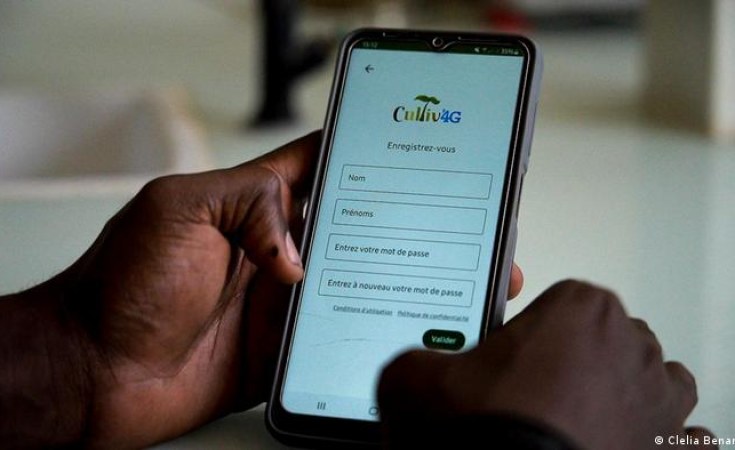Newly-developed farming apps have brought relief to farmers in Ghana who struggle to access fair market prices. Developers hope the apps will soon also be used on a wider scale to tackle food insecurity on the continent.
Abel Agbango is a a vegetable farmer and has spent the past 12 years carefully cultivating his farmland in Ghana.
The 38-year-old doesn't have any other profession: His vegetable farm is his only source of livelihood.
But Agbango isn't worried about that right now. His main concern is accessing the direct market in urban areas and getting a decent price for his produce -- a problem for which he still hasn't found a solution after all these years.
"We often don't get to sell our produce at fair prices," Agbando told DW. "The intermediaries are mostly market women [who] don't give us fair prices."
Agbango says he's been at a loss to change his predicament for years.
"There is nothing we can do about it because [the market women] have direct contact with consumers," he explained. "This is a major problem for us."
But a solution for farmers like Agbango could soon be in sight: Some young tech entrepreneurs in Ghana are turning their attention to Africa's agricultural sector. They believe they may hold the key to opening up more opportunities for farmers to get better value for their produce, while also tackling post-harvest losses and food insecurity.
Apps changing the game
Several software applications have already flooded Ghana's burgeoning tech space, with signs they are already proving a game-changer for many farmers.
Five years ago, the agro-tech firm AgroCenta launched an app which enables farmers to sell their produce to consumers directly. They can even upload pictures of their produce, so the consumer can see what they are buying.
The biggest challenge facing the app is the lack of internet service in remote areas. But the company says it has still reached at least 12,000 farmers.
AgroCenta's CEO and co-founder, Francis Obirikorang says his firm is now servicing four regions in Ghana.
"We are working with 12,000 small holder farmers," he told DW. "We make a monthly revenue of $50,000 (€50,000), connecting these 12,000 smallholder farmers to five major off-takers."
AgroCenta recently announced that it is looking to scale up its service across Ghana's borders into other parts of Africa. But they're already facing competition in Ghana.
Teaming up for a solution
At the onset of the COVID-19 pandemic, Ghana's Institute for Scientific and Technological Information of the Council for Scientific and Industrial Research (CSIR) assembled a group of software engineers to help create mobile and web applications that wouldn't just help farmers get a good price, but agro-input shops and marketers, too.
The result: Kuafo MarketPlace, an online platform developed through the Modernizing Agriculture in Ghana (MAG) program under the CSIR, which also helps prevent fraud and enables trackability.
To login to the platform, users must first become a member of a registered farmer-based organization (FBO) or be verified by the platform managers themselves.
The application also has a feature which lets prospective buyers directly contact the seller of any commodity before a transaction can be agreed upon.
Michael Wilson, who was part of the innovation team, told DW that one of the main goals of the project is to "make agri-farming lucrative, especially to the youth."
Beyond that, Wilson and the other developers also want "to solve some of the problems that are plaguing the world, including Ghana."
"We realized that there is a post-harvest loss, and most of these post-harvest losses are attributed to the inability of produced food to reach markets or consumers," he explained.
Farmers already feeling relief
Many farmers are already benefiting from the use of these apps: Their revenues are growing and they're less concerned about food insecurity. Last year, Agbango also decided to switch to using apps to sell his vegetables.
Before, he used to sell less than $1000-worth of produce a quarter. Now, he's earning much more, telling DW that the "app is helping me a lot."
"Before the produce is ready for harvest, we take pictures of them and place it on the app for consumers to see and order," he said.
"The app has really helped not only to get fair prices but reduce our post-harvest losses."
According to Ghana's Ministry of Food and Agriculture, post-harvest losses account for 30 to 40% of food wastage in Ghana.
With these kinds of results, the potential to boost Ghana's agricultural sector could become massive in the coming years, as these tech solutions only continue to expand and improve.
Edited by: Ineke Mules


